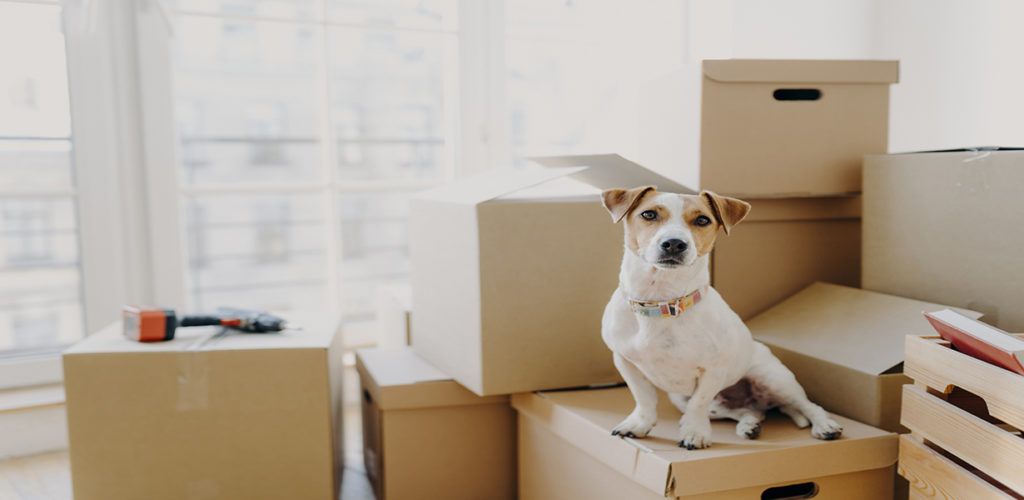A permanent change of station (PCS) can be stressful for not only the humans inside your home, but also for your furry friends as well. They are often hyper-aware of the changes going on in your home and recognize that a transition may be underway. From added people in and out of the house to their owners being a bit more distracted than usual to tangible things like rugs and window coverings being removed, it’s wise to take necessary steps to ensure that the move is smooth and easy for your critters too! Below are seven tips for relocating with pets.
1. House Preparations
In all of your preparations to get your home ready to be evacuated, animals and their comforts will certainly be impacted. As much as possible, try to make sure those things that bring your pets the stability they have come to expect are in place. Keep feeding dishes and sleeping spots in the same place for as long as possible. Make sure their favorite toys, harnesses, and leashes stay unpacked and accessible throughout the transition.
2. Health Care Preparations
Just as you might be getting all of the humans in the house their final well-care checkups and dental cleanings before a move, it is also vital to make sure your animals are up to date on their health visits. Whether they are needing vaccines, boosters, or medicine refills, schedule time to get your pet’s health needs taken care of. If you will be traveling internationally, renting a home, or living on base, up-to-date health records for your pets may mean the difference in your having access to these places.
3. Transportation
Transportation is another important area where you will need to think ahead about your pet! Whether you are caravaning in your personal vehicles or taking flights, knowing how your pets will travel may take some extra preparations. Does your pet have special kennels or crates that they use? Will the one you bought for the new puppy when you arrived at your current duty station now need to be upsized or upgraded? Do you have any specialty items needed for reptiles, tropical birds, or even fish? Beyond the vessel your pet will need to travel safely, don’t forget their food, bowls, waste disposal items, or anything else they will need for day-to-day living between houses.
4. Lodging
When you are relocating, particularly when traveling a great distance, finding places to stay that are pet friendly might present a challenge. Are you staying with family members that are not pet owners? Will you utilize hotels or vacation rentals? Don’t wait to get your accommodations scheduled until the last minute, especially if you are relocating during a popular travel time like summer or during the winter holidays. Not only may lodging be difficult to come by, but finding places that allow pets (especially multiple pets) could present a challenge. If possible, for dog owners in particular, try to book rooms with easy access to the ground level and green spaces so it’s less of a hassle to take your pet out for frequent potty breaks and exercise.
5. Arriving at the New Place
You have finally gotten through the packing up of your previous home, you have traveled, you have lodged, and now you are officially home again. At this stage in the move, it is really easy to overlook some of your pet’s needs when the immediate and urgent aspects of setting up your new space seems to take priority. The sooner you can acclimate your pet to your new home, the sooner he or she will begin to feel more at ease. If you have an outdoor pet, be sure the fencing area is secure before leaving a pet outdoors unattended. For indoor pets, make sure that the place you plan to keep the pet is well-ventilated and free of items that might pose a danger to your animal.
6. Finding New Practitioners
Once you get somewhat settled in your new home, make it a priority to establish care with a new veterinarian practice nearby. If you have any digital or hard copy records from your last vet, be sure to request those ahead of time. It is especially important to locate a reliable health care provider for your animals right away and know the available locations and hours for emergency or urgent care visits, should you need to be seen.
7. Take Time to Show Some Extra TLC
Finally, when you are relocating, it is important to take some extra time to show your beloved animals some extra care, attention, and affection. Moving is stressful for everyone but your pet may experience heightened stress as well. While they aren’t able to verbally articulate this stress like your partner or children, they may be somewhat dysregulated as well. A few extra cuddles, walks around the block, and “good boy” or “good girl” accolades will help to put this beloved member of your family at ease.

